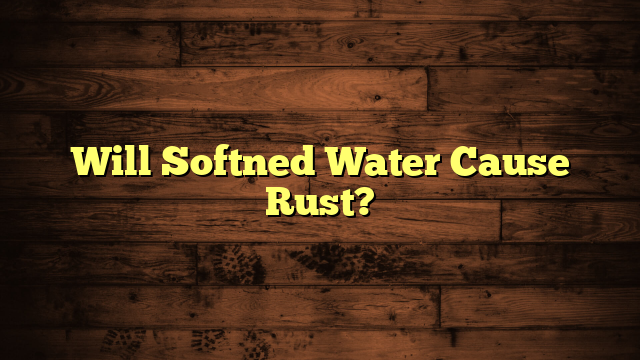Will Softned Water Cause Rust?
You might wonder if softened water actually leads to rust in your plumbing. While softened water itself isn't a direct culprit, it can create conditions that favor rusting, especially in iron pipes. The chemistry of softened water alters how it interacts with metal, potentially increasing the risk of corrosion. So, what does this mean for your home's plumbing system? Understanding the interplay of softened water and rust could help you make informed decisions about maintenance and prevention strategies.
Key Takeaways
- Softened water itself does not directly cause rust; it alters mineral content but does not introduce rust-forming elements.
- The removal of calcium and magnesium can make softened water more aggressive towards certain metals, increasing rust potential in iron pipes.
- Higher moisture levels and a lower pH in softened water can accelerate the corrosion process, particularly in iron plumbing.
- Regular maintenance and inspections are essential to prevent rust in plumbing systems, regardless of water softness.
- Using water filtration systems alongside softeners is recommended in areas with high iron content to mitigate rust risks.
Understanding Softened Water
Softened water, unlike hard water, has undergone a process to remove minerals like calcium and magnesium, which can cause scale buildup in pipes and appliances. This process typically involves ion exchange, where the hard minerals are replaced with sodium ions.
You'll quickly notice several softened water benefits, especially if you live in an area with high water hardness. For one, your appliances will run more efficiently, leading to less maintenance and longer lifespans.
In a water hardness comparison, softened water makes activities like washing clothes or dishes much more effective. You'll find that soap lathers better, requiring less detergent, which can save you money over time.
Additionally, you might enjoy softer skin and shinier hair after bathing, since the absence of harsh minerals helps reduce dryness.
While you may not think much about the water you use, understanding the differences can enhance your daily life. Embracing softened water can lead to a noticeable improvement in your home's comfort and efficiency, making it a worthwhile consideration if you're dealing with hard water issues.
The Science of Rust Formation
Rust is a chemical byproduct that forms when iron or its alloys react with oxygen and moisture in the environment. This oxidation process occurs when iron loses electrons, creating iron oxide, commonly known as rust. Understanding this process is vital for effective rust prevention.
Here are three key factors that contribute to rust formation:
- Moisture Levels: High humidity or water exposure accelerates the oxidation process, making iron more susceptible to rust.
- Oxygen Availability: The presence of oxygen is essential for rust to form. Even in small amounts, it can trigger the reaction with iron.
- Electrolytes: Salts and other chemicals in water can enhance conductivity, facilitating the flow of electrons and speeding up the rusting process.
Factors Influencing Rust Development
When it comes to rust development, water chemistry and environmental conditions play essential roles.
You mightn't realize how factors like pH levels and humidity can accelerate or slow down rust formation.
Understanding these influences can help you take better care of your metal objects and prevent corrosion.
Water Chemistry Effects
Water chemistry plays an essential role in the development of rust, impacting how metals react over time. Understanding the factors at play can help you mitigate rust formation effectively.
Here are three key aspects to evaluate:
- Water Ionization: The degree of ionization in water influences the electrochemical processes that lead to rust. Higher ion concentrations can accelerate corrosion, while lower levels may slow it down.
- Mineral Composition: The minerals present in your water supply can either promote or inhibit rust. For instance, hard water, rich in calcium and magnesium, may create a protective layer on metals, while soft water lacks these minerals and can expose metals to rust more readily.
- pH Levels: The acidity or alkalinity of the water impacts corrosion rates. Acidic water (low pH) tends to be more corrosive, increasing the likelihood of rust, whereas neutral or slightly alkaline water can be less damaging.
Environmental Conditions Impact
Various environmental conditions play a significant role in the development of rust on metal surfaces. Understanding how factors like environmental humidity and temperature fluctuations affect rust can help you protect your metal items more effectively.
Here's a quick overview of how these factors influence rust development:
| Factor | Effect on Rust Development | Example Conditions |
|---|---|---|
| Environmental Humidity | High humidity accelerates rusting | Coastal areas, rainy climates |
| Temperature Fluctuations | Rapid changes can create condensation | Seasonal temperature changes |
| Air Quality | Pollutants increase corrosion risk | Urban environments |
| Surface Condition | Dirt and moisture promote rust | Unclean or unprotected surfaces |
| Protective Coatings | Lack of coatings allows rust to form | Unprotected metal items |
When humidity is high, moisture collects on metal surfaces, leading to faster oxidation. Similarly, temperature fluctuations can cause condensation, which also contributes to rust. By keeping these conditions in mind, you can take proactive steps to minimize rusting, such as ensuring proper ventilation and using protective coatings. Ultimately, being aware of these environmental factors will go a long way in preserving your metal belongings.
Softened Water vs. Hard Water
In recent years, the debate between softened water and hard water has gained attention as more people seek to understand their impact on home plumbing and appliances.
When you evaluate the differences, you'll notice that softened water benefits often outweigh the drawbacks of hard water.
Here are three key points to reflect upon:
- Scale Buildup: Hard water contains minerals like calcium and magnesium, which can lead to scale buildup. This can clog pipes and reduce appliance efficiency over time.
- Soap Efficiency: With hard water, soap and detergent don't work as effectively. You might find yourself using more product to achieve the same cleaning results, leading to higher costs.
- Skin and Hair: Many people find that softened water is gentler on their skin and hair. Hard water can leave residue, making it feel dry and unmanageable.
Understanding these aspects can help you make informed decisions about your water quality.
While both types have their pros and cons, it's important to weigh the softened water benefits against the hard water drawbacks to determine what's best for your home.
Impact on Plumbing Systems
When you switch to softened water, you might notice a change in how your plumbing system reacts.
Softened water can actually reduce the corrosion rate in pipes, but the material of your pipes plays an essential role too.
Understanding the effects of water chemistry on your plumbing can help you make informed decisions for your home.
Corrosion Rate Reduction
Softened water can greatly reduce the corrosion rate in plumbing systems, leading to longer-lasting pipes and fixtures. When you opt for softened water, you're not just improving water quality; you're also enhancing the longevity of your plumbing.
Here's how it helps:
- Lower Corrosive Potential: Softened water contains fewer minerals that contribute to corrosion, meaning your pipes face less aggressive wear over time.
- Enhanced Corrosion Inhibitors: The absence of hardness minerals allows for more effective corrosion inhibitors to work, protecting your plumbing from rust and degradation.
- Reduced Metal Fatigue: By minimizing the factors that accelerate metal fatigue, softened water helps maintain the integrity of your plumbing materials, ensuring they function as intended for years.
With these benefits, you can expect to see a significant decrease in maintenance costs associated with plumbing repairs and replacements.
Pipe Material Considerations
Choosing the right pipe material is essential for maintaining a healthy plumbing system. Different pipe materials offer varying levels of corrosion resistance, which can greatly influence your plumbing's longevity and overall performance. When you opt for softened water, understanding how it interacts with these materials is key.
Here's a quick overview of common pipe materials and their corrosion resistance:
| Pipe Material | Corrosion Resistance |
|---|---|
| Copper | High |
| PVC | Excellent |
| PEX | High |
| Galvanized Steel | Moderate |
| Cast Iron | Low |
When selecting plumbing pipes, consider your home's specific needs and the water's characteristics. For instance, copper and PEX offer great corrosion resistance, making them ideal for most situations. On the other hand, galvanized steel and cast iron may corrode more rapidly, especially with softened water.
Water Chemistry Effects
Understanding water chemistry is essential for maintaining the integrity of your plumbing system. The balance of water pH and mineral content can greatly affect how your pipes perform over time.
When you soften water, you change its chemistry, which can lead to potential issues.
Here are three key factors to evaluate:
- Water pH: Softened water typically has a lower pH level. If it's too acidic, it can corrode metal pipes, leading to rust and leaks.
- Mineral Content: When minerals are removed from water, it can become more aggressive toward the plumbing materials. This aggressive nature can lead to increased wear and tear on your pipes.
- Chemical Reactions: The changes in water chemistry can also promote reactions between different metals in your plumbing system, potentially causing galvanic corrosion.
Signs of Rust in Your Home
Rust can be a sneaky invader in your home, often showing up in places you least expect. You might notice it on tools, pipes, or even appliances. Early detection is essential, so keep an eye out for these common signs of rust:
| Location | Signs of Rust | Rust Detection Methods |
|---|---|---|
| Bathroom Fixtures | Brownish-red stains | Visual inspections and touch |
| Garage Tools | Flaking or pitted surfaces | Use a magnet to check for corrosion |
| Pipes | Discoloration or leaks | Moisture meters and visual checks |
Understanding these signs can help you catch rust before it becomes a bigger problem. Regular inspections and monitoring can serve as effective rust detection methods. If you spot any signs, consider applying rust prevention techniques to mitigate further damage. Keeping your home rust-free is possible with vigilance and timely action!
Preventive Measures to Consider
Taking proactive steps can greatly reduce the risk of rust in your home. By implementing effective preventive treatments and committing to regular maintenance, you can protect your property from potential damage.
Here's what you should consider:
- Inspect and Repair: Regularly check pipes, faucets, and appliances for leaks or signs of corrosion. Promptly address any issues to prevent moisture buildup that can lead to rust.
- Use Rust Inhibitors: Apply rust-inhibiting paints or coatings on exposed metal surfaces. These preventive treatments create a barrier against moisture and oxidation, greatly reducing rust formation.
- Control Humidity Levels: Maintain a consistent humidity level in your home, ideally between 30-50%. Use dehumidifiers or air conditioning to keep excess moisture at bay, as high humidity can accelerate rust development.
Expert Opinions and Recommendations
When it comes to the relationship between softened water and rust, experts often emphasize the importance of informed choices. You might be wondering how softened water affects your plumbing and appliances.
According to expert insights, softened water doesn't directly cause rust. Instead, it alters the mineral content in your water, which can influence corrosion rates in certain metals.
The expert consensus suggests that while softened water is generally safe, it's essential to reflect on your system's materials. For instance, if you have iron pipes, softened water could exacerbate rusting due to the removal of minerals that previously formed protective layers.
To mitigate any risks, experts recommend regular maintenance and inspections of your plumbing systems.
Moreover, they advise you to think about using a water filtration system alongside your softener, especially in areas with high iron content. This can help preserve your plumbing and appliances while ensuring you get the benefits of softened water.
Finally, don't hesitate to consult a local professional for personalized recommendations tailored to your specific situation. By taking these steps, you can enjoy softened water without the worry of rust damage.
Frequently Asked Questions
Can Softened Water Harm My Plants or Garden?
Softened water can affect your garden health. It often contains sodium, which might harm some plants. Monitor your soil's salt levels, and consider using rainwater or untreated water for sensitive plants to guarantee better growth.
Does Softened Water Affect the Taste of Drinking Water?
Imagine sipping your favorite soda. Softened water can change the taste of your drinking water due to its altered mineral content. If you have specific taste preferences, you might notice a difference in flavor.
Is Softened Water Safe for Pets?
Softened water's generally safe for pets, but it's crucial to take into account individual health needs. If your pet has specific conditions, consult your vet to verify softened water aligns with their overall pet health requirements.
What Is the Lifespan of Plumbing With Softened Water?
Softened water can enhance your plumbing lifespan by reducing mineral buildup. With improved water quality, pipes experience less corrosion and scaling, allowing them to last longer. Regular maintenance also contributes greatly to extending their overall durability.
Can Softened Water Cause Any Skin Irritation?
Softened water can cause skin irritation for some individuals, particularly if you have preexisting skin conditions. You might notice symptoms like dryness or itchiness, so it's wise to monitor your skin's reaction to it.
Conclusion
In the dance between softened and hard water, one can lead to rust while the other shields against it. Softened water may feel gentle, but beneath its surface lies a potential for corrosion, quietly eating away at your pipes. To keep your plumbing healthy, balance is key—monitor pH levels and minerals like a tightrope walker. With regular checks, you can prevent rust from creeping in, ensuring your home remains a fortress against the unseen threat.







